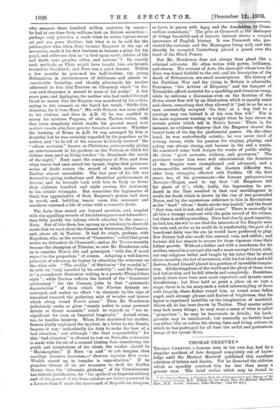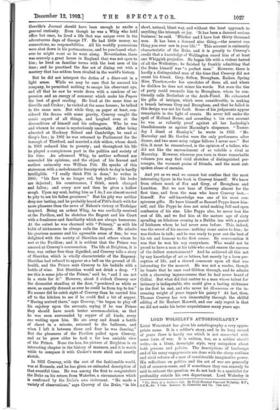THOMAS CREEVEY.*
THOMAS CairEvEv, a famous man in his own day, had by a singular accident of fate dropped completely out of know- ledge until Sir Herbert Maxwell published this excellent selection of letters and diaries. Yet he deserved the oblivion which so speedily overtook him far less than many a greater man. The brief notice which may be found in • Tie Creeoey Papers: ;Selection fir,•ontitteheRCorirteeffoonndeist.ce and Dianes of thlls, late C2rv"oll;Y: M.P. 'John Iturray. Right 61.na]Herbert • H.P..
Greville's Jour•nal should have been enough to excite a general curiosity. Even though he was a Whig who held office but once, be lived a life that was unique even in the adventurous days of George IV. He had little money, no connections, no responsibilities. All his worldly possessions were shut down in his portmanteaux, and be purchased what- ever he might want as he went along. Nevertheless, there was scarcely a great house in England that was not open to him ; he lived on familiar terms with the best men of his time; and he practised the fine art of dining out with a mastery that has seldom been rivalled in the world's history.
But he did not interpret the duties of a diner-out in a light sense. While we may be Bare that he amused his company, he permitted nothing to escape his observant eye, and all that he saw he wrote down with a candour of ex- pression and an energy of comment which make his Papers the best of good reading. He lived at the same time as Greville and Croker ; he visited at the same houses ; he talked to the same men. But while they, on paper at least, con- sidered the drama with some gravity, Creevey caught the comic aspect of all things, and laughed even at the discomfiture of himself and his colleagues. Who he was and whence he came is mysteriously uncertain. Alter being educated at Hackney School and Cambridge, he read at Gray's Inn; in 1802 he was returned to Parliament for the borough of Thetford, and married a rich widow, whose death in 1818 reduced him to poverty; and throughout his life he played a conspicuous part in the politics and society of his time. An advanced Whig, he neither softened nor concealed his opinions, and the object of his fiercest and earliest animosity was William Pitt. He speaks of this statesman with a melodramatic ferocity which to-day is hardly intelligible. "I really think Pitt is done," he writes in 1803; "his face is no longer red, but yellow; his looks are dejected ; his countenance, I think, much changed and fallen; and every now and then he gives a hollow cough. Upon my soul, hating him as I do, I am almost moved to pity to see his fallen greatness." But his pity was neither deep nor lasting, and he probably heard of Pitt's death with far more pleasure than the news of Nelson's victory at Trafalgar inspired. Being an ardent Whig, he was cordially received at the Pavilion, and he sketches the Regent and his Court with a frankness and familiarity which are always humorous. At the outset he was charmed with " Prinney," as with his habit of nicknames he always calls the Regent. He admits his gracious manner and his agreeable sense of fun; he was delighted with the society of Sheridan and others whom he met at the Pavilion; and it is evident that the Prince was amused at Creevey's conversation. The life at Brighton, it is true, was rather free than dignified, and Creevey tells a story of Sheridan which is wholly characteristic of the Regency. Sheridan had refused to appear at a ball on the ground of ill- health, and the Prince sent Creevey to his bedside with a bottle of wine. But Sheridan would not drink a drop. "I see this is some joke of the Prince," said he, "and I am not in a state for it." However, about 2 o'clock Creevey saw the dramatist standing at the door, "powdered as white as snow, as smartly dressed as ever he could be from top to toe." No sooner did he catch sight of Creevey than he carried him off to the kitchen to see if he could find a bit of supper. " Having arrived there," says Creevey, "he began to play off his cajolery upon the servants, saying if he was Prince they should have much better accommodation, so that he was soon surrounded by supper of all kinds, every one waiting upon him. He ate away and drank a bottle of claret in a minute, returned to the ballroom, and when I left it between three and four he was dancing." But the pleasures of the Pavilion palled upon Creevey, and an he grew older he took a far less amiable view of the Prince. None the less, his picture of Brighton is an interesting chapter in the history of manners, and it is worth while to compare it with Croker's more staid and courtly sketch.
In 1815 Creevey, with the rest of the fashionable world, was at Brussels, and he has given an animated description of that eventful time. He was among the first to congratulate the Duke on his return from Waterloo, a circumstance which is confirmed by the Duke's own statement. "He made a variety of observations," says Creevey of the Duke, "in his short, natural, blunt way, and without the least approach to anything like triumph or joy. 'It has been a damned serious business,' he said. Bliicher and I have lost thirty thousand men. It has been a damned nice thing,—the nearest run thing you ever saw in your life.'" This account is eminently characteristic of the Duke, and it is greatly to Creevey's credit that a knowledge of Wellington cured him of at least one Whiggish prejudice. He began life with a violent hatred of all the Wellesleys ; he finished by frankly admitting that the Duke himself was "a perfect man." However, there is hardly a distinguished man of the time that Creevey did not count his friend. Grey, Sefton, Brougham, Raikes, Spring Rice, Thurlow,—he has anecdotes of them all, and where he dislikes he does not mince his words. Not even the ties of party could reconcile him to Brougham, whom he con- tinually calls Beelzebub or the Arch-Fiend. He exhausted his gifts of intrigue, which were considerable, in making a breach between Grey and Brougham, and that be failed in this design was not his fault. Some of his judgments appear remarkable in the light of events. He never fell under the spell of Holland House, and according tt. his own account he was as valiantly proof against all her Ladyship's blandishments as against Macaulay's eloquence. "Yester- day I dined at Stanley's," he wrote in 1833. "Mr. Macaulay and Mr. Gordon were the only performers after dinner, and two more noisy vulgar fellows I never saw." But this, it must be remembered, is the opinion of a talker, who did not like the encroachment of so voluble a rival as Macaulay. However, wherever you turn in these remarkable volumes you may find vivid sketches of distinguished per- sonages, the warmest praise of friends, and the most out- spoken abuse of enemies.
And yet as we read we cannot but confess that the most interesting figure in the book is Creevey himself. We know from others much of Fox and Grey, of Brougham and Lambton. But we now hear of Creevey almost for the first time, and from the man who knew Creevey best,— himself. For self-knowledge was one of his most con- spicuous gifts. He knew himself as Samuel Pepys knew him- self, and like Pepys he does not mind making full and open confession of his sins. Like Pepys also, he never lost the zest of life, and we find him at the mature age of sixty spending an hilarious evening in a Dublin inn with a parcel of Irishmen whom he had never seen before. This, indeed, was the secret of his success : nothing came amiss to him ; he was tireless in talk ; and he was ready to pour out the best of his wit and humour to the first corner. By conversation it was that he won his way everywhere. Who would not be proud to have a man at his table who could ensure the success of the dullest entertainment P And he achieved all this not by any knowledge of art or letters, but merely by a keen per- ception of life, and a shrewd comment upon all that was interesting for the moment. He was not a reader, though he boasts that he once read Gibbon through, and he admits with a charming ingenuousness that he had never heard of Cellini. But what did that matter to a man whose talent for intimacy is indisputable, who could give a lasting nickname to the first he met, and who never let ill-success or the in- creasing weight of years impair his gaiety P At last, then, Thomas Creevey has won immortality through the skilful editing of Sir Herbert Maxwell, and our only regret is that we did not make his better acquaintance many years ago.



























































 Previous page
Previous page